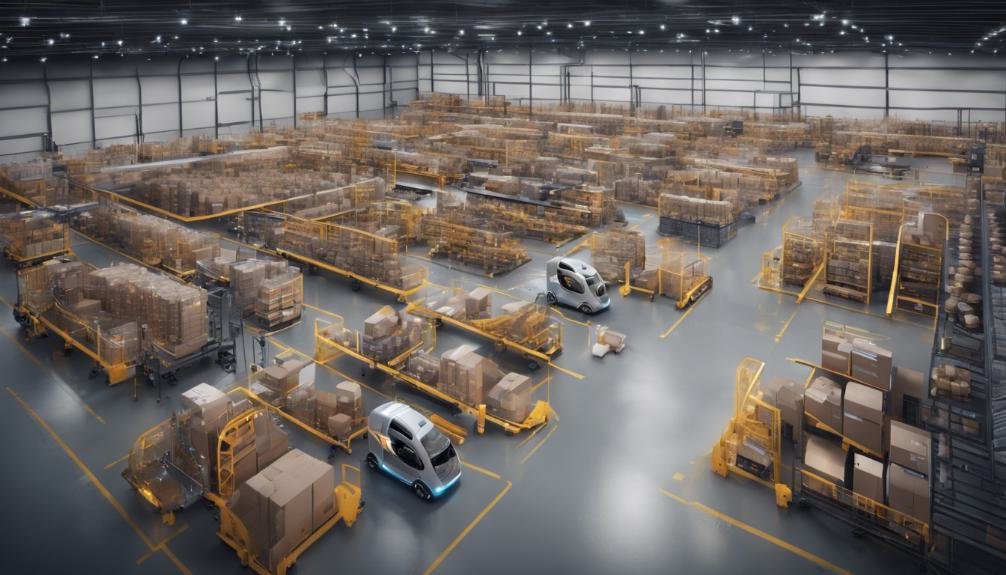AI in Supply Chain Management
In the domain of Supply Chain Management, AI isn't just a helpful tool – it's the very heartbeat that sustains efficient operations and drives competitive advantage. Imagine a world where every aspect of your supply chain is finely tuned, anticipating needs before they arise and optimizing resources with pinpoint accuracy. The integration of AI technologies isn't merely a trend but a fundamental shift in how businesses navigate the complexities of global logistics. Stay tuned to uncover how AI is reshaping the future of supply chain management, paving the way for unprecedented levels of automation and adaptability.
Key Takeaways
- AI optimizes inventory management, reducing stockouts and excess inventory.
- Machine learning enhances demand forecasting accuracy.
- Predictive maintenance with AI minimizes downtime and costs.
- Route optimization algorithms streamline delivery routes for efficiency.
- Real-time inventory tracking avoids stockouts and improves customer satisfaction.
Benefits of AI in SCM
Implementing AI technologies in supply chain management can lead to numerous advantages for businesses looking to enhance efficiency and optimize their operations. One key benefit is cost savings. By utilizing AI algorithms to analyze data and predict demand, companies can reduce excess inventory, minimize stockouts, and ultimately lower storage and carrying costs. This improved visibility into the supply chain also allows for better monitoring of supplier performance, which can lead to more strategic partnerships and further cost reductions.
Another advantage is increased accuracy. AI-powered systems can process vast amounts of data with precision, reducing errors in forecasting, inventory tracking, and order fulfillment. This enhanced accuracy not only improves customer satisfaction but also helps in maintaining ideal inventory levels and reducing waste.
Additionally, AI enables faster decision-making. By automating routine tasks and providing real-time insights, businesses can swiftly respond to changes in demand, market trends, or disruptions in the supply chain. This agility can give companies a competitive edge by enabling them to make informed decisions quickly and adapt to dynamic business environments.
AI-powered Inventory Management
AI-powered inventory management revolutionizes the way businesses track, monitor, and optimize their stock levels to meet customer demand efficiently. By leveraging advanced algorithms and real-time data analysis, AI enhances inventory control, minimizes stockouts, and reduces excess inventory costs.
One key area where AI excels is in managing supplier relationships. AI algorithms can predict supplier lead times, assess supplier performance, and automate reordering processes based on historical data and demand forecasts, ensuring ideal inventory levels are maintained.
Furthermore, AI complements inventory management through warehouse automation. Through the integration of AI with robotics and IoT devices, warehouses can automate tasks such as picking, packing, and inventory replenishment, leading to increased efficiency and accuracy in inventory management processes. This automation not only reduces labor costs but also minimizes human errors, thereby improving overall inventory visibility and operational effectiveness.
As businesses aim for leaner supply chains and faster response times, AI-powered inventory management emerges as a crucial tool in achieving these objectives.
Demand Forecasting With AI
Enhancing inventory management efficiency, demand forecasting with AI optimizes supply chain operations by predicting future customer needs based on historical data and market trends. Machine learning algorithms play a vital role in this process by analyzing vast amounts of data to identify patterns and correlations that human analysts might miss.
By leveraging these algorithms, companies can enhance demand forecasting accuracy, leading to better inventory management and reduced costs.
AI-powered demand forecasting offers a more precise understanding of customer preferences and behaviors, enabling businesses to anticipate fluctuations in demand with greater accuracy. This increased accuracy minimizes the risk of stockouts or excess inventory, ultimately improving overall operational efficiency.
Enhancing Operational Efficiency
You can streamline your supply chain operations through AI by optimizing inventory levels, ensuring you have the right amount of stock without excess.
Predictive maintenance powered by AI can help you anticipate machinery issues, reducing downtime and increasing overall efficiency in your operations.
Inventory Optimization Benefits
Inventory optimization is crucial for streamlining supply chain operations and improving efficiency. Enhancing supply chain visibility helps businesses track inventory levels, anticipate demand fluctuations, and optimize stocking strategies. This visibility fosters better coordination among supply chain partners, resulting in cost reductions through efficient inventory management practices.
Additionally, maintaining inventory accuracy is vital for customer satisfaction. Leveraging AI technologies to optimize inventory levels helps businesses prevent stockouts and overstock situations, enhancing customer service levels. Accurate inventory data allows companies to fulfill customer orders promptly, boosting satisfaction and loyalty.
Predictive Maintenance Advantages
Utilizing predictive maintenance in supply chain management offers significant advantages in enhancing operational efficiency by proactively identifying and addressing equipment maintenance needs before they escalate into costly disruptions. By leveraging machine learning algorithms, predictive maintenance enables more accurate maintenance scheduling based on actual equipment performance data rather than predefined timetables. This targeted approach not only reduces maintenance costs but also minimizes downtime by preventing unexpected breakdowns.
Cost reduction is a key benefit of predictive maintenance. Instead of relying on reactive maintenance practices that can lead to higher repair expenses and production delays, predictive maintenance allows for timely interventions that address issues before they become critical.
Additionally, the ability to predict when maintenance is needed helps optimize resource allocation and ensures that maintenance activities are conducted precisely when required, maximizing equipment availability and overall operational efficiency.
AI Applications in Logistics
You can harness the power of AI in logistics through route optimization algorithms. These algorithms can help streamline delivery routes for maximum efficiency.
Predictive maintenance solutions driven by AI can foresee equipment failures. This allows for proactive maintenance and minimizing downtime.
Real-time inventory tracking using AI technology enables precise monitoring of stock levels. This aids in avoiding stockouts and overstock situations.
Route Optimization Algorithms
Implementing advanced route optimization algorithms in logistics systems greatly enhances efficiency and cost-effectiveness in supply chain management. These algorithms, focusing on vehicle routing and delivery optimization, play an important role in streamlining operations within the supply chain.
By utilizing these algorithms, companies can achieve optimized transport scheduling, reducing delivery times and costs considerably.
The vehicle routing aspect of these algorithms intelligently assigns the most efficient routes for each delivery vehicle, considering factors like traffic patterns, delivery windows, and vehicle capacities. This optimization leads to reduced fuel consumption, lower transportation expenses, and improved overall delivery performance.
Moreover, delivery optimization algorithms within supply chain management systems help in determining the best routes to deliver goods to customers promptly. By analyzing various parameters such as order volumes, delivery locations, and real-time traffic data, these algorithms ensure that deliveries are made in the most efficient manner possible, ultimately enhancing customer satisfaction and operational effectiveness.
Predictive Maintenance Solutions
Predictive maintenance solutions powered by artificial intelligence revolutionize logistics operations by proactively identifying equipment failures before they occur, optimizing maintenance schedules, and minimizing disruptions in the supply chain. By leveraging machine learning and data analytics, these solutions enable businesses to shift from reactive to proactive maintenance strategies.
Through continuous asset monitoring, AI algorithms analyze equipment performance data in real-time, predicting potential issues and recommending maintenance actions to prevent breakdowns.
Maintenance scheduling becomes more efficient with AI, as algorithms consider various factors like usage patterns, environmental conditions, and historical maintenance data to create optimized maintenance plans. This predictive approach helps in reducing downtime, lowering maintenance costs, and extending the lifespan of assets.
Additionally, by addressing maintenance needs before they escalate, businesses can guarantee smoother operations and enhance overall supply chain reliability.
Incorporating predictive maintenance solutions into logistics processes not only enhances operational efficiency but also boosts productivity by enabling businesses to focus on strategic initiatives rather than dealing with unexpected equipment failures.
Real-Time Inventory Tracking
Enhancing supply chain efficiency, real-time inventory tracking utilizing AI applications in logistics provides businesses with immediate visibility into stock levels and movement throughout their operations. By implementing warehouse automation integrated with AI, companies can accurately monitor inventory in real-time, enabling them to make data-driven decisions swiftly. This level of visibility allows for better demand forecasting, optimized stocking levels, and reduced holding costs.
Supply chain visibility is essential for businesses to streamline operations and meet customer demands effectively. Real-time tracking through AI technologies ensures that stockouts and overstock situations are minimized, improving overall operational efficiency. Additionally, by leveraging AI in inventory tracking, companies can enhance order fulfillment processes and reduce lead times, ultimately boosting customer satisfaction levels.
Incorporating real-time inventory tracking with AI not only enhances operational efficiency but also provides a competitive edge in today's fast-paced business environment. By embracing these technologies, businesses can stay ahead of the curve and adapt quickly to changing market demands.
Role of Predictive Analytics
Utilizing advanced data analysis techniques, you can leverage predictive analytics to optimize decision-making processes within the supply chain management framework. By employing machine learning applications and data visualization tools, predictive analytics can enhance risk assessment and supply chain optimization strategies.
Machine learning applications within predictive analytics can analyze historical data to forecast future trends, allowing you to anticipate demand fluctuations accurately. These insights enable proactive decision-making, such as adjusting inventory levels or optimizing transportation routes to meet changing demand patterns efficiently.
Moreover, data visualization tools play an essential role in transforming complex supply chain data into actionable insights. Visual representations of predictive analytics results help you identify potential bottlenecks, anticipate disruptions, and make informed decisions swiftly.
Through predictive analytics, you can proactively mitigate risks, streamline operations, and enhance overall supply chain efficiency. By incorporating these analytical tools into your decision-making processes, you can stay ahead of the curve in an ever-evolving supply chain landscape.
Autonomous Vehicles in Supply Chain
Incorporating autonomous vehicles into the supply chain system revolutionizes transportation efficiency and logistics management through cutting-edge automation technology. These vehicles operate without human intervention, enhancing speed and accuracy in the delivery process.
However, despite the numerous benefits, safety concerns remain a critical issue. Ensuring that autonomous vehicles can navigate complex environments safely and interact with other vehicles and pedestrians is essential for their successful integration into supply chain operations.
Moreover, regulation challenges pose another obstacle to the widespread adoption of autonomous vehicles in the supply chain. Governments and regulatory bodies worldwide are still developing frameworks to govern the use of these vehicles on public roads.
Addressing issues such as liability, insurance, and compliance with existing traffic laws is vital to establishing a clear legal framework for the deployment of autonomous vehicles in logistics. Overcoming these safety concerns and regulation challenges is key to maximizing the full potential of autonomous vehicles in optimizing supply chain operations.
Future of AI in SCM
The integration of AI technologies into Supply Chain Management (SCM) is reshaping the future landscape of logistics operations with unprecedented efficiency and data-driven decision-making capabilities. AI integration in the supply chain is poised to revolutionize how businesses manage their operations, from procurement to distribution. Supply chain automation with AI is set to streamline processes such as demand forecasting, inventory management, and route optimization.
By leveraging AI algorithms, companies can enhance supply chain visibility, mitigate risks, and improve overall performance.
In the future of AI in SCM, we can expect to see increased adoption of advanced analytics and machine learning models to optimize supply chain networks further. AI-powered systems will enable real-time tracking of shipments, predictive maintenance of equipment, and dynamic pricing strategies.
Additionally, the use of AI in SCM will facilitate adaptive planning and agile decision-making, allowing businesses to respond swiftly to market fluctuations and customer demands. As AI continues to evolve, its role in supply chain management will become indispensable for organizations aiming to stay competitive in a rapidly changing business environment.
Conclusion
To sum up, AI in supply chain management is like having a skilled conductor orchestrating a symphony of efficiency and precision.
With AI-powered inventory management, demand forecasting, and logistics optimization, businesses can streamline operations and adapt quickly to market changes.
The integration of predictive analytics and autonomous vehicles further enhances supply chain performance.
Embracing AI technology is essential for staying competitive and ensuring timely deliveries in the dynamic landscape of modern supply chains.







